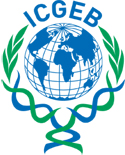International Centre for Genetic Engineering and Biotechnology facts for kids

Logo of ICGEB
|
|
| Established | 1983 |
|---|---|
| Staff | 600+ |
| Budget | Approx. €60 million (as of 2023) |
| Website | www.icgeb.org |
The International Centre for Genetic Engineering and Biotechnology (ICGEB) is a special science organization that studies genetics and biology to help people all over the world. It was started in 1983 as a project of the United Nations Industrial Development Organization (UNIDO), which is part of the United Nations.
The ICGEB became its own independent organization on February 3, 1994. Today, it works with more than 65 countries to use science to solve big problems.
Contents
What is the ICGEB?
The ICGEB is an intergovernmental organization, which means it's a group created by different countries working together. Its main goal is to use advanced science, like genetic engineering and biotechnology, for good. This helps make sure that scientific discoveries can benefit everyone, especially people in developing countries.
A Global Science Team
The ICGEB has a team of over 600 scientists and staff. They work in three main laboratories located in different parts of the world:
Having labs on different continents helps the ICGEB work on problems that are specific to those regions. It also allows scientists from many different backgrounds to collaborate and share ideas.
What Does the ICGEB Do?
The ICGEB focuses on several key areas to achieve its goals. It acts like a hub for science, education, and innovation.
Scientific Research
Scientists at the ICGEB work on more than 45 major research projects. Their work helps us understand and fight diseases, and find new ways to use biology in medicine and industry.
Fighting Diseases
A big part of the ICGEB's research is on health. They study:
- Infectious Diseases: These are illnesses caused by germs, like viruses or bacteria. ICGEB scientists research diseases that affect millions of people.
- Non-Communicable Diseases: These are long-term illnesses that are not spread from person to person, such as cancer and heart disease.
Using Biology for Good
The ICGEB also works in biotechnology. This means using living things, like cells or bacteria, to create useful products.
- Medical Biotechnology: Creating new medicines and treatments.
- Industrial Biotechnology: Finding greener ways to make products like fuel and plastic.
- Plant Biology: Developing crops that can resist disease or grow better in difficult climates.
Helping Young Scientists
The ICGEB believes in training the next generation of scientists. It offers programs for students who want to continue their education after college.
- PhD and Postdoctoral Fellowships: These are special programs that allow young scientists to do research at ICGEB labs and earn advanced degrees.
- Meetings and Courses: The ICGEB organizes events where scientists from all over the world can meet, learn from each other, and share their latest discoveries.
Supporting Science Worldwide
The ICGEB provides money, called grants, to scientists in its member countries. These grants help researchers set up their own labs and work on important local problems. The organization also helps turn scientific ideas into real products that can be used by industries, a process called Technology Transfer.
 | Bessie Coleman |
 | Spann Watson |
 | Jill E. Brown |
 | Sherman W. White |

